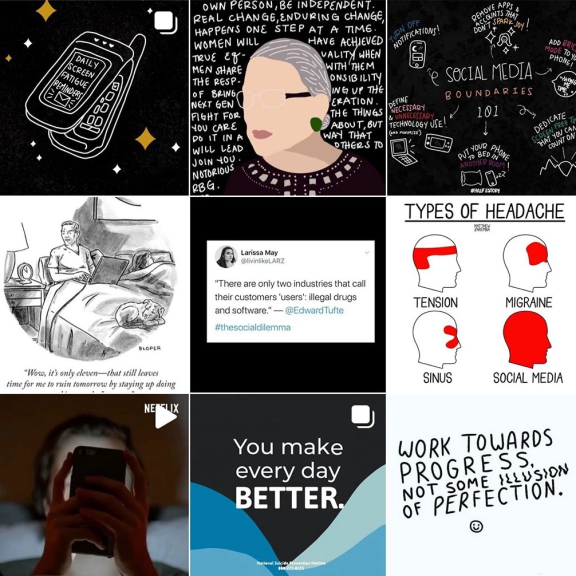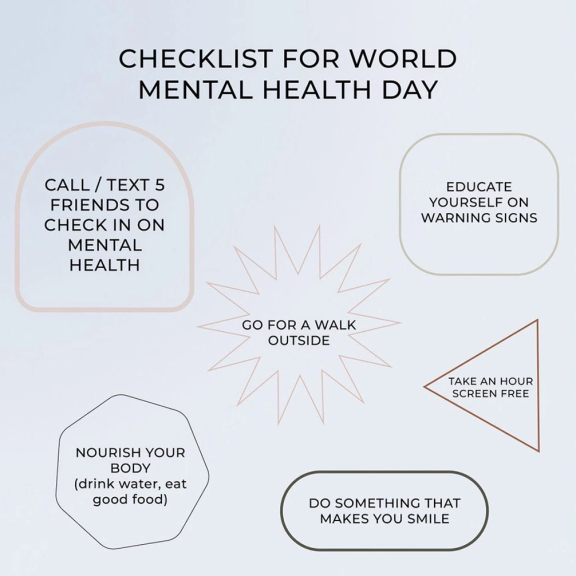Mental illness is complicated, but not talking about it doesn’t make it less so. Part of our mission is to help people feel better, both physically and mentally, and while CBD can help, there are many tools you can lean on for support. Mental Health Memos is a series that delves into the importance of destigmatizing mental illness and shines a light on those who are using their voice to bring these conversations to front and center.
In a year in which uncertainty seems to be the rule rather than the exception, scheduling this interview was no exception for Larissa May. Currently sheltering-in-place in Sonoma, California, the founder of digital wellness platform #HalfTheStory and Director of Marketing for Kin Europhics had to unexpectedly evacuate due to wildfires in California.
Luckily, Larissa — Larz, for short — was able to return home a few days after she’d run out the door with little more than a few keepsakes from her grandmother and her computer. As a leader who advocates for digital wellness for Gen Z and beyond, Larz is all about mindfully adapting to one’s circumstances. “I've always been someone that winds up being in the eye of the storm in some way, shape or form,” she says, laughing. “But I think I tend to deal with chaos pretty well, like most of us in the moment.”
This disruption of “normalcy” (whatever that means in 2020) was yet another opportunity this year to reflect on what’s truly important and why tending to our mental health is of utmost importance. We spoke with Larz for insights into how we can mindfully interact with the digital landscape to ensure we’re supporting our mental health journey, as well as how to take that much-need time away from the digital world so we can be present in the physical one.
It’s about how you repurpose your anxiety, right? You have a finite amount of energy in a day, and anxiety and stress take away from that. And so for me, being able to maintain some sort of a balance relies on a couple of things: First, choosing your sources and the things you really want to be intentionally tuned in to.
Second, having [dedicated] times in which you're actually immersed in [those sources] — maybe over your morning coffee. Turn off notifications for Twitter and your news platform; if you’ve seen The Social Dilemma [documentary on Netflix], you know we don't really have control over what enters our life unless we take control of it.
Finally, make a list of things that you can do on your phone or with technology to actually put that energy and anxiety in the right place.
For me, the moments of discomfort and growth are happening offline. They might be triggered online, but if I don't pursue them in the real world and with the people that I love and the people that I think are really experiencing these traumas, then I won't grow.
The internet is a place for consumption — a place to share information. Which is great. But it's also a place for a lot of stress and trauma. We need to remember that the point of the internet is not just to make change in this isolated universe, but to propel conversations in the real world. The real change happens within your own community and your own circles and your own families.

I think the big one is the realization that you can be anywhere in the world, but nothing can replace being with the people you love. Having a community is a gift is something I don't think I'll ever take for granted.
The second thing is going back into that zone of intention. I did a lot of unintentional socializing when I was in New York. We live in a culture that is so fast-paced, and sometimes socializing is very transactional. Do you really need to have a coffee with someone? Or can you just kinda get to the point and make the ask? I think that’s something we need to take back with us into the world.

When #HalfTheStory started, it was at a time where the world was still completely committed to perfection, and we were able to be one of the first to start that conversation. Over the past few years, we’ve seen an evolution away from that — for instance, less photoshopping and major celebrities being more authentic and sharing looks into their life.
But the idea of humans creating personas and having this sense of competition is something that is not new to the digital age; it’s been going on for thousands of years. I believe that you have the right to put your best foot forward; if you go to work and you want to wear make-up, you should not be judged for wearing make-up because that's what makes you feel good, and I think the same thing translates to the digital world. But there is a line that you cross. And when you’re not able to authentically connect with yourself and your platform and you start to make others feel less than or disconnected from themselves, you are hurting the social equation rather than supporting it.
Having a headache. My posture — like, checking if I’m hunching over. Feeling less than or like I’m not enough. And when I’m losing track of time — that’s a big one. You can’t get all that time back!
1. Learn and understand the effects of media on your health. Screen time is the first step into understanding. What does it do to your brain and body?
2. Do an intake of your digital habits. Take inventory over the course of a weekend, when you’re not working. How does it make you feel? Do you have an intention when you pick up your phone?
3. Do a restart. Once you look at those habits, set boundaries for yourself. Get rid of subscription services you don’t use. Make it hard to get onto those apps with tools like Freedom. Cut out the things that take up your brain space. You’ll see a significant change.
4. Implement tools that you can use when you start to lose your footing. Put social media apps into a folder so they’re harder to access. Use the grayscale feature on your phone, which makes it not as interesting because there’s no color. Put your phone in “brick mode,” which sets up an away message for your texts.
Digital wellness is the next frontier of wellness. Similar to tobacco use or the way we eat, we have to respond and build healthy habits from the start. I think there needs to be funding around digital wellness like there was for D.A.R.E. [for kids in school], and a much bigger conversation as it relates to federal policy. As soon as the federal government puts resources being something, society begins to take it a little more seriously. And we need a system of checks and balances in the tech world — no more capitalizing on the emotional well-being of consumers and youth for profit!

